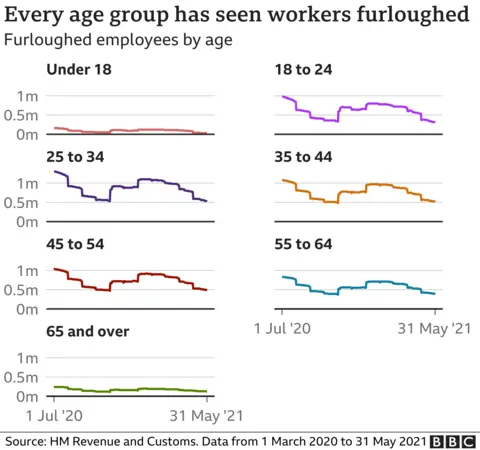Covid: UK's furlough scheme starts to wind down
More than a million workers came off furlough in May as the economy reopened, leaving the scheme supporting the fewest people since the start of the pandemic.
At the end of May, 2.4 million people still relied on the scheme for their income, the latest HMRC figures show.
The furlough measures are being phased out by the end of September.
But with parts of the economy still limited by the virus, some firms are calling for an extension to the scheme.
Terry George, who owns the Mission night club in Leeds as well as several other venues, said he expected some of his staff would be made redundant as a result of the phase-out of furlough.
"We can't afford to pay people out of a pot that has no money coming in," he told the BBC's Today programme. "We're going to have to lose some staff."
He called for the scheme to be extended until businesses such as his were back up and running.
Over the next three months, firms will have to shoulder more of the costs of the scheme as the government starts to wind down its support. Staff will continue to receive 80% of their wages, but employers will pay part of that for the first time.
"The furlough isn't simply being switched off," Business Secretary Kwasi Kwarteng told the BBC's Today programme. "All we're saying is that the employer should contribute something to the payroll, and then over time, over the next three months, the furlough will be will be taken away.
"It's a difficult balanced decision to make, the furlough wasn't going to last forever," he added. "I think, as we open up in two weeks' time, this is the right time to think about the balance of payroll, which the government pays and which employers pay."
The Treasury said its furlough funding was still substantial and had deliberately been retained over the summer to provide more certainty.
Labour questioned whether it was fair to ask bosses to contribute towards the salaries of furloughed staff if they were not yet permitted to reopen.
"Nightclubs can't open today, they don't know what capacity and rules they will be working under when they do, they have no income, they are still racking up debts, and today they have to start paying towards furlough payments," said Jeff Smith MP.
The government has spent £66bn on the Coronavirus Job Retention Scheme, as furlough is officially known, and it has supported 11.6 million jobs since March 2020.
But as the economy has gradually reopened many workers have returned to their jobs.
Estimates from the Office for National Statistics' weekly survey suggest that numbers continued to fall in June, and that there are now between 1.3 million and 1.9 million people on the scheme.

'I felt so guilty!'
 Gemma Walker
Gemma WalkerGemma Walker from Bradford, loves her job as an account manager for Newmarket Holidays. But because she's on furlough she hasn't worked for 15 months, an experience she has found difficult.
"I felt an overwhelming sense of guilt about the colleagues at Newmarket who are still working," she says. "They've really held the fort for the rest of our team."
She used to travel around the country, talking to clients and going to conferences.
"When something like that is completely taken away from you, you almost feel lost," she says. "My purpose is gone now because this is what I've worked towards my whole career, starting way back when I was 17 years old.

'A lot of people didn't come back'
The furlough scheme has helped to prevent a spike in unemployment; jobless rates have remained below 5%, despite the pandemic shock to the economy.
Employers have been able to retain qualified staff, and reopen businesses quickly when pandemic restrictions allowed.
"The furlough scheme has been critical. It's part of the difference between survival and not," said Mark Vincent, chief financial officer at travel company Newmarket Holidays.
But he said that his firm, like others in the travel sector, would inevitably need to consider redundancies.
"In those winter months, we're all going to be loss-making and therefore, we're going to have to relook at what we do with our staffing."
Steve Haslam, who owns pub chain TLC Inns, said he was very grateful that the government had provided an income to his employees, but he is more sceptical of the benefits to business, particularly the idea it would help firms retain staff.
"A lot of people didn't come back to work... because they just didn't want to come back, either into the industry or they'd gone off and found second jobs. We had one site where 80% of staff left."
He believes the end of furlough will make it easier for hospitality businesses like his to recruit new staff.
 Holly Haslam
Holly HaslamAt the start of the pandemic, most of those on furlough were in younger age brackets.
But as the economy has reopened, many younger workers have returned to their old jobs or to new ones. Now about half of the people left on furlough are over 45, according to the Resolution Foundation.
The think tank says that older workers on furlough are now more likely to be let go, if businesses decide to restructure in the face of uncertainty.

"Reopening the economy has led to a surge in people returning to work from furlough, particularly young people in sectors like hospitality and leisure," said Karl Handscomb, senior economist at the Resolution Foundation.
"But not everyone is back working. Over one in four older workers who were furloughed during the recent lockdown have remained parked on furlough during the reopening, and now face a higher risk of unemployment as the scheme starts to be unwound."


The hundreds of billions in support has been dizzying, historic, and effective at keeping unemployment much lower, but now the great rollback begins.
Though the economy is bouncing back strongly, this is a moment of acute sensitivity, as businesses start to discover whether they will keep going as government support is slowly withdrawn.
The most significant change will be a reduction in the generosity of the furlough scheme. Employers must find the equivalent of a tenth of their workers' wages, with that proportion increasing next month.
The holiday for stamp duty will also begin to be tapered, the business rates holiday becomes less generous, and delayed payments for VAT will restart.
All this comes with restrictions still in place, and some sectors, such as travel, very unlikely to get back to normal soon.
Business groups representing small businesses have warned of a serious economic flashpoint.

Low numbers
It is unclear whether the end of furlough will lead to a significant rise in the unemployment rate, according to Tony Wilson, director of the Institute for Employment Studies.
Given the strength of the economic recovery, the number of job vacancies being advertised, and the fall in the number of people on furlough since the beginning of the year, Mr Wilson said the number of people being made unemployed could be in the "low hundreds of thousands rather than the millions" as feared last year.
He said that by September, when the scheme ends, the number of people on full furlough "will be pretty low indeed".
